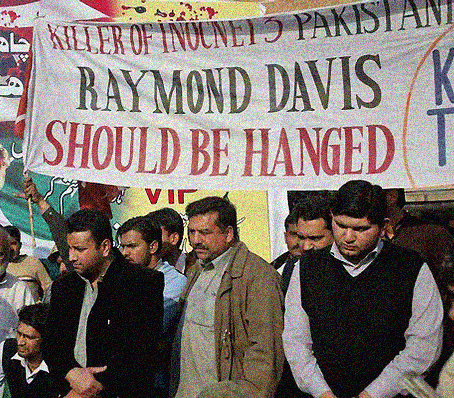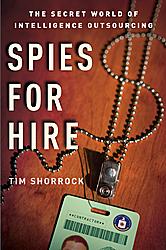
Raymond Davis Incident Shows How Tangled U.S.-Pakistan Web Is
The Raymond Davis incident encapsulates the growing estrangement between the two countries over their respective strategies in Afghanistan.

The Raymond Davis incident encapsulates the growing estrangement between the two countries over their respective strategies in Afghanistan.

Vang Pao’s passing reminds us how U.S. enables drug dealing as means to foreign-policy ends.
An idea for a new CIA-based reality show.
If we ask some hard questions about the means and ends of intelligence-gathering, perhaps we might discover that all this spycraft is as overrated on our side as on theirs.
CIA drone operators conflicted over drone strikes.

During the Bush years, the CIA lost its sense of smell. On the torture issue, its lawyers no longer could tell what was fishy and what was not.

The CIA’s involvement in targeting drug traffickers in Peru and terrorists in Pakistan shares a similar lack of accountability.
The latest assassination scandal reveals a longstanding congressional oversight problem.
The Obama administration has yet to make substantive change in the way the United States does intelligence work.

Come meet author and Foreign Policy In Focus contributor Tim Shorrock, when he speaks at IPS about his new book, SPIES FOR HIRE: The Secret World of Intelligence Outsourcing.
Since 9/11 and the invasion of Iraq, newspaper headlines and the blogosphere have been afire with revelations about the U.S. government’s enormous use of private sector contractors to carry out the tasks of war: Halliburton’s lucrative Iraqi reconstruction contracts, CACI International’s civilian interrogators at Abu Ghraib, and the shooting of noncombatants in Baghdad by the shadowy security firm Blackwater, to name just a few. But the size and scope of the private sector’s influence on U.S. intelligence agencies—and the government’s unsettling efforts to hide the truth from the public—have never been known until now. In SPIES FOR HIRE: The Secret World of Intelligence Outsourcing (Simon & Schuster; May 6, 2008; $27.00), investigative journalist Tim Shorrock presents the first-ever comprehensive profile of the astonishingly lucrative intelligence contracting industry—where profit often trumps patriotism.
SPIES FOR HIRE exposes how, from the tracking of al-Qaeda to the Bush administration’s warrantless eavesdropping on U.S. citizens, private contractors have infiltrated every corner of intelligence gathering in America. Drawing on insider documents and exclusive interviews with sources including former agency operatives and CEO’s of private intelligence firms, Shorrock lifts the highly secretive veil off the mysterious world of intelligence contracting, demonstrating the shocking truth that over 70 percent of the massive U.S. intelligence budget is now spent on contractors, with minimal congressional oversight. Bankrolled with tax money, these private firms are exerting enormous influence on governmental policies that affect all Americans.
The West is seriously misreading what is going on in Tibet.
Congress and the next president must take U.S. intelligence agencies away from the Pentagon and put them under civilian control.

The United States has a long history of complicity in Indonesia’s human rights abuses. As columnist Conn Hallinan explains, the Bush administration is unfortunately upholding that tradition.

In his introduction to the series ‘China: What’s the Big Mystery?’ John Feffer tries to answer the riddle of congagement.
Will a change in the leadership of the Pentagon and Congress translate into a new U.S. military policy?